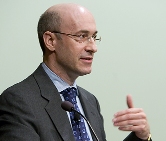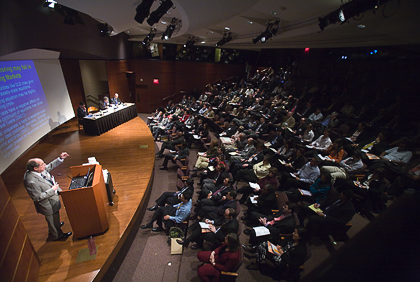Financial Globalization: Latest Research Findings

At a two-day Research Department conference on financial globalization, prominent researchers inside and outside the Fund discussed their latest work on the macroeconomic implications of financial globalization.
The IMF Research Department (RES), in collaboration with Cornell University, organized a conference on "New Perspectives on Financial Globalization" at the Fund on April 26-27. The conference attracted a number of prominent researchers working in this area and featured cutting-edge research presented by outside academics as well as several IMF economists. The conference keynote speech was delivered by Federal Reserve Governor Frederic Mishkin and the conference forum, which was open to the public, featured Guillermo Calvo, Jeffrey Frankel, and Kenneth Rogoff.
The organizers of the conference—M. Ayhan Kose (RES), Enrique G. Mendoza (University of Maryland and RES), Eswar S. Prasad (Cornell University), and Marco E. Terrones (RES)—offer the following summary.Financial globalization is a topic at the core of the Fund's mandate. Indeed, few issues have stirred such passionate debate among development researchers and policymakers as the benefits and costs of financial globalization. Over time, with the accumulation of country experiences, development of new theoretical models, and compilation of new empirical evidence, views about the merits of capital account liberalization have evolved within the IMF as well as in the policy and academic communities. Research done at the IMF has contributed in an important way to the evolution of views. In particular, work done in RES has over the years had a tremendous impact in guiding this debate and setting the agenda for academic researchers.
The topics covered at the conference, while at the frontier of the academic literature, were also nicely tied in to issues that are at the center of the IMF's own work. The pattern of global capital flows is of course closely related to the matter of global current account imbalances. The IMF has taken the lead in recognizing that this is a problem that cuts across national boundaries and interests, and that any solutions will also need to be multilateral in nature. A number of papers at the conference attempted to tackle the question of why global imbalances have evolved in the manner they have; this will in turn have important implications for understanding how they might be resolved.
The perverse pattern of capital flows in recent years, whereby capital seems to be flowing "uphill" from poorer to richer countries, has brought to the foreground the questions of whether foreign capital is good or bad for growth, and whether international financial markets are misallocating capital. Does it make sense for developing countries to run current account surpluses and accumulate large quantities of reserves, notwithstanding the conventional view that such countries face domestic capital scarcity? Understanding the motives of policymakers and economic agents in such countries, as well as the institutional and other constraints that generate such outcomes, is a worthwhile exercise. Several papers on this topic featured prominently on the conference program.
It is now generally accepted that developing countries have not fully attained the benefits that would be expected from financial globalization. The IMF has been advocating the development of new financial instruments, such as GDP-indexed bonds, that will allow developing countries to better take advantage of financial globalization to share risk. The research presented at this conference on the patterns of risk sharing, and the impediments to risk sharing among developing countries, thus has important implications for the Fund's work in this area.
These topics also link up with a broader thrust of the Fund's work, to better integrate surveillance of macroeconomic policies and domestic financial markets. Participants at the conference felt that a better understanding of the interplay between these factors, and how they interact with developments in international financial markets, will be essential for effective surveillance. Indeed, this provides a unifying theme for much of the exciting research that is being undertaken in RES, some of which was showcased at the conference.
The conference keynote speech, delivered by Governor Mishkin of the Federal Reserve Board, emphasized the importance of establishing institutions that can foster financial sector development. Mishkin noted that it is not simple to establish such institutions in developing countries because of the opposition of interest groups that fear losing from the implementation of necessary reforms. However, he argued that one powerful tool to get around this problem is through the process of globalization. In particular, he claimed that trade liberalization can be a key driver of financial sector development while opening financial markets can increase access to and lower the cost of capital.
The conference concluded with an economic forum that drew a standing-room only crowd and featured a lively discussion. The panel was comprised of three distinguished academics—Guillermo Calvo, Jeffrey Frankel, and Kenneth Rogoff. Calvo launched the discussion by saying that he felt "there is a lot of complacency" on financial globalization considering that, in the context of floating exchange rates, emerging markets in particular are at risk relying on the "weak anchor" of interest rates. He said that the key challenge for emerging markets is when and how central banks should intervene in exchange markets so that the public will see it "not as a break in the rule but as part of the rule."
Frankel followed by saying that financial crises are likely to continue to occur, but some things are different about the current situation that make it more stable, including higher reserve holdings among emerging economies, more flexible exchange rates, less dollar borrowing, more collective action clauses, and more openness to trade and direct foreign investment. Rogoff noted that research conducted by RES staff and other departments at the Fund has had a huge influence on the capital account liberalization debate. He called for more research on these issues, noting that it was important that the IMF build up its analytical capabilities during these benign times, so that the institution would be better prepared to respond nimbly and creatively to future crises.
 Guillermo Calvo addresses conference participants
Guillermo Calvo addresses conference participants
